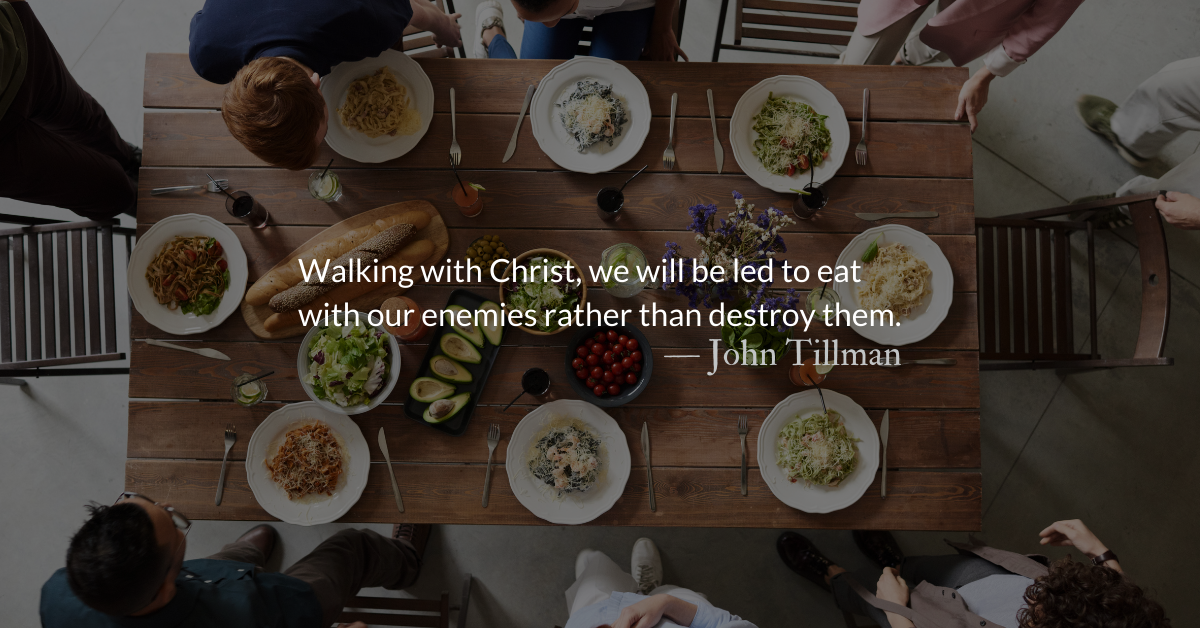Scripture Focus: 2 Kings 6.17-18, 20-23
16 “Don’t be afraid,” the prophet answered. “Those who are with us are more than those who are with them.”
17 And Elisha prayed, “Open his eyes, Lord, so that he may see.” Then the Lord opened the servant’s eyes, and he looked and saw the hills full of horses and chariots of fire all around Elisha.
18 As the enemy came down toward him, Elisha prayed to the Lord, “Strike this army with blindness.” So he struck them with blindness, as Elisha had asked.
20 After they entered the city, Elisha said, “Lord, open the eyes of these men so they can see.” Then the Lord opened their eyes and they looked, and there they were, inside Samaria.
21 When the king of Israel saw them, he asked Elisha, “Shall I kill them, my father? Shall I kill them?”
22 “Do not kill them,” he answered. “Would you kill those you have captured with your own sword or bow? Set food and water before them so that they may eat and drink and then go back to their master.” 23 So he prepared a great feast for them, and after they had finished eating and drinking, he sent them away, and they returned to their master. So the bands from Aram stopped raiding Israel’s territory.
Matthew 26.52-54
52 “Put your sword back in its place,” Jesus said to him, “for all who draw the sword will die by the sword. 53 Do you think I cannot call on my Father, and he will at once put at my disposal more than twelve legions of angels? 54 But how then would the Scriptures be fulfilled that say it must happen in this way?”
Psalm 23.5
5 You prepare a table before me
in the presence of my enemies.
You anoint my head with oil;
my cup overflows.
Reflection: Eating With Enemies
By John Tillman
Elisha was, perhaps, never more Christ-like than when he led an army of his political enemies into the citadel of his spiritual enemies and then directed everyone to sit and eat a meal together.
This wasn’t a kumbaya moment where everyone held hands and decided to get along. It was a power play. Elisha demonstrated that God alone was king—not Joram, not the king of Aram, Yahweh. Elisha, through God’s power, prepared a table in the presence of his enemies and made them eat together. (Psalm 23.5)
However, no demonstration of God’s power is sufficient to prevent human rebellion. After a short peace in which Aram avoided Israel’s territory, hostilities resumed. After calling Elisha, “Father,” and being obedient during a crisis, Joram and Israel’s kings returned to their idolatry.
No miracle or display of power can sustain faith. The Bible proves over and over that miraculous signs and wonders will not convince us to abandon our idols for long.
Sin is too ingrained in us to be sanded off, like a minor imperfection. Sin is too bold to be frightened away. It crouches at our door. It seeks to master us. It asks to sift us. It hovers over us like a mighty predator. It surrounds us like an army.
Yet, we are not without hope. Like Elisha’s servant, we need our eyes opened to realize those with us are greater than those with them. He that is within us is greater than he that is in the world. (1 John 4.4) The sin that stalks us, has been defeated by the one who walks with us. (Psalm 23.4) The sin that crouches at our door has been nailed to Christ’s cross. (Genesis 4.7) Sin intends to sift us, but Christ has prayed for us. (Luke 22.32)
Like Peter, we will deny Christ, draw our swords, and sin. But we can turn back and strengthen others. Walking with Christ, we will be led to eat with our enemies rather than destroy them.
When Christ leads us into the heavenly city, we will find ourselves dining and worshiping with people we harmed or who harmed us. Christ’s love will cover all, Christ’s justice will restore our hurts and harms, and we will feast together.
However, we shouldn’t wait for eternity. Let us call on God’s power for peace, not destruction. Let us love our enemies today. Through Christ, enemies can eat together in peace.
Divine Hours Prayer: The Call to Prayer
Be strong and let your heart take courage, all you who wait for the Lord. — Psalm 31.24
– From The Divine Hours: Prayers for Summertime by Phyllis Tickle.
Today’s Readings
2 Kings 6 (Listen – 5:05)
1 Timothy 3 (Listen – 2:10)
Read more about Christless Forgiveness is the Absence of Justice
Forgiveness is unjust if forgiveness is simply letting evil succeed…if victims are never heard and no one ever answers for their pain.
Read more about The Undeserved Banquet of the Gospel
God sets his table for scoundrels, shaking hands with undeserved trust.








